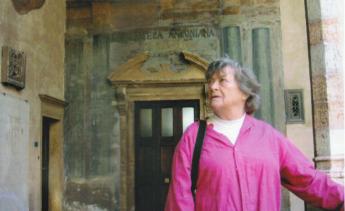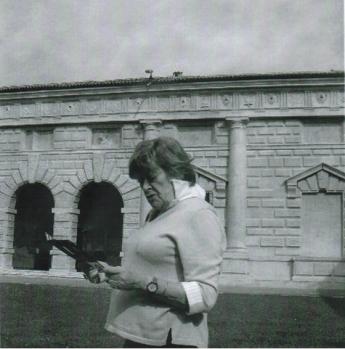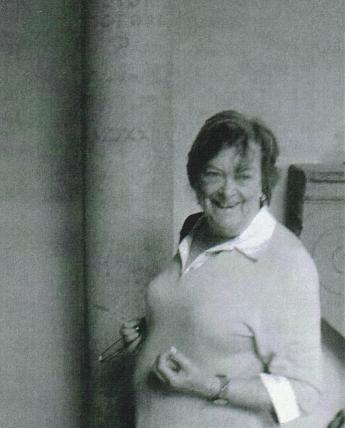Diana Parikian

By Beatie Wolfe
We hope that, like Sarah Bernhardt, there will be many more such “last performances”
The Book Collector
Diana Parikian, one of the most gift, hardworking and highly regarded booksellers in the trade, recently announced her ‘retirement’, prompting the above remark in The Book Collector. Diana created whole fields of collecting interests and library trends, from emblem books to Wunderkammer, and many a rare book collector and librarian is indebted to her. Her finds include neo-Latin Renaissance literature, early theatre, opera libretti, documents of art history as well as forays into conjuring and cookery. Diana belongs to that small group of booksellers who actually read, or at least browse, the contents of obscure books, in Latin. Italian and French, to discover some unknown feature. She has published 80 catalogues over the last 45 years.
How it began
I was very lucky. I was at a bookseller's with my husband; we went into the back room, which was very dirty, and as I pulled the books off the shelf, 1 realised that everything in there was imperfect and there was no point staying. Then suddenly I got this physical feeling - it's the only time it has ever happened to me and I don't really believe in it. For some reason I pulled this book out. It was a composite volume of eight first editions by Erasmus marked at something like £ 9. I went straight to Jacques Vellekoop and asked for £ 100. He bought it and I later saw it in his catalogue for £ 1,000. So we were all happy. Although Jacques insists that I actually said: ‘Oh sod it, I'll do my own catalogue!'
The first purchase
My first book wasn't very exciting; it was a midwifery handbook and I bought it at a market stall in Brussels and sold it to William Dawson for a very considerable profit of £ 3 10 shillings. But the second book was exciting; it was a very important architectural book by Vignola, sold as a collection of plates. And I was introduced very swiftly to the complications of the watermark. Once I'd done the work I sold it as what it was, which was the first edition. That really got me going.
Specialist subject
I specialise in continental books before 1650 if I can find them, which is increasingly difficult. Why? Because I started running books to Jacques Vellekoop, who was at EP Goldschmidt - he was EP Goldschmidt at that point - and he taught me so much. I was uneducated, I had never heard of Erasmus and I learnt a terrific lot from him because he would say things like: ‘Yes, Ducky, that's simply lovely but now bring me the second edition because...' He was the best teacher anyone could ever have.
Female of the species
It was fun being one of the first female antiquarian booksellers in a male dominated industry. It was great. Obviously there were a lot of advantages, but there were also disadvantages. You just take advantage of the advantages. If you can do it, which I suspect you can't anymore, you get the best of both worlds. People opened doors for you, which was lovely. You behaved like a man in business, you hoped, but you were treated like a woman.
Peerless performers
It's very difficult to choose my favourite dealers. I would say Andre Jammes because he has the sort of books I like best, Nicolas Poole Wilson because he is really scholarly and knows books better than most people and Rick Watson because he just is a very, very good bookseller. That's my top three I would say.
City breaks
I get my best books from colleagues on the whole. It used to be that I'd go to English bookshops in the cathedral towns because they all had secondhand bookshops with a rare book room or knew English books terribly well and I'd say, 'Have you got any foreign books?' And they'd say, ‘Yes at the back.' Then you could find things. But most of them have closed down now because they can't afford the rent.


Teething troubles
The first ABA book fair was a nightmare, it went on for 16 days - I can't remember whether we did the weekends or not, but I think we did. It was on Albemarle Street then and if you were in the basement it was very hot and stuffy. But it was quite fun in a way; you met people you didn't normally meet.
Sleight of hand
I think my sympathetic customer is one who everybody knows, called Bill Kalush. He knows far more about his subject - which is not conjuring per se, but the art of deception in the largest sense - than any bookseller does. So you can always learn from him, which is as enjoyable as it is rare. Also he buys every edition of every book, which is a bookseller’s dream and he's frightfully nice.
Taken as red
I have had several awful customer experiences, but one printable one. At a book fair my friend Pauline, who was working for me then, said, ‘It’s no good just having a customer's name and address, we need to know something about them.' So she wrote on the back of their card any feature that would remind us. About one she wrote: 'Whinges on about getting a discount. Says that Fiammetta always gives him one.' Later the chap bought a book. I took out the card for my new assistant so she would know his address; unfortunately she put it in the book and sent it to him. He took it very well I have to say. He corrected it in red and sent it back, but I don't think he deserved it.
Top tip
I think everybody has strokes of luck, but with me it's a question of being dogged with every book. You used to do very well by getting to the top shelf, up a ladder, or to the bottom shelves because the elderly and fat miss the top and the bottom. Now I'm old and fat, I still do the bottom shelf.
Paper trail
There are several ways the trade has changed. I think not having a bookshop in every market town let alone every cathedral city is the main difference, but the Internet obviously has changed everything. People buy books from amateurs, which means you've got plenty of people buying books who don't know that it should have a title page, for example. But it's very useful for selling secondhand books because people can just press a button and find a book they want to read. I do it myself the whole time. I think with rare books it's harder to do well. Of course I occasionally sell something online, but on the whole I do better with a printed catalogue. I think that is because a lot of my books go to libraries and librarians mainly prefer reading a printed catalogue rather than one online. They're not looking for a specific book on the whole, they're looking for a specific type of book, a book that's printed in a special place for example and that is easier to find in a catalogue. Anyhow I shall not do anymore (catalogues), I'm bored of them now!
No regrets
Given the time again, I don't think I would change anything. 1 mean it's no good; you can't change yourself. I'm not a good businesswoman, therefore I'm not a very good bookseller, but I enjoy bookselling. I'm not amateurish about it I don't think, but perhaps I would have got in a bookkeeper sooner. My accounts have always been completely chaotic.
Follow your nose
My advice to novice dealers is to listen to other booksellers, older ones and clever young ones. You can learn a lot from most people. Get educated and see a profit where there is one. But it is really a question of your nose, isn't it? Some people know everything about books and have no idea about making a profit. If you’re like that, go into partnership with somebody who is good at business. But of course you could do well without my advice, I wouldn’t dream of giving anybody any advice.
The holy grail
There's a book that was printed in Milan in the first decade of the 16th century, which contains a woodcut, Ecce Homo. I've never seen it and I would like to find it lurking somewhere marked 100 Euros. It's truly the most beautiful woodcut. Very simple, very stark, very tragic, wonderful!
That's your lot
I remember clearly my first auction. I was viewing at Hodgson's Room (on Chancery Lane, later taken over by Sotheby's). It was quite extraordinary. There was an auction every week, thousands of books. I was viewing, and Jack Joseph, who was also viewing next to me, said, 'what are you doing here, my dear?' To which I replied, `I'm looking at books which I hope to buy.' Without looking up, he shook his head sadly, and said, `Oh, you don't want to do that, my dear, you want to buy privately.' I replied, ‘Well, if you pass onto me the names of people who want to sell you books, that'll be fine.' He chuckled, and said no more. Later, during the auction, he ran me up. I paid much more than I wanted but was perfectly happy; I wasn't going to be intimidated.
I'm the auction houses' minimal customer these days. I usually go but I only really bid on things I think someone else might not have noticed or that I might know something about that other people don't. I'm not there to compete in public, unless I want it very badly.
The interview was published in the ABA Newsletter 362 (May 2011), and is presented here by permission of the author.
>>> Diana Parikian
